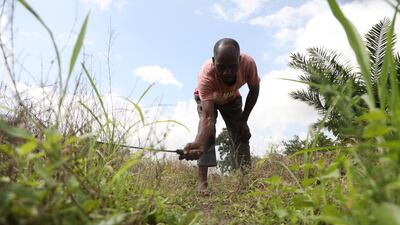The number of conflicts will increase in the future due to climate change-caused food and water scarcity, a report has shown.
The Ecological Threat Report, published on Wednesday by the Institute for Economics and Peace, revealed that a 25 per cent rise in food insecurity will increase the risk of conflict by 36 per cent.
It also stated that one billion people are living in 42 countries that currently face severe food insecurity and that one in four people globally do not have regular access to safe drinking water.
Steve Killelea, founder and executive chairman of the IEP, told The National he will urgently be raising the report’s findings at Cop28, taking place in Dubai this month.
“The ecological threats are substantial and existing and are going to get worse without substantial action and it will cause the number of conflicts to rise,” he said.
“It needs concerted action. One billion people are suffering with severe food insecurity. I will be raising this at Cop28.
“I think we will be looking for people to understand that climate change is very, very serious and these ecological issues exist today and are getting worse. Climate change is aggravating it and we need to address it today.
“The problems are systemic and need to be addressed.”
The report covers 221 countries and independent territories broken down into 3,594 subnational areas.
It analyses ecological threats globally and assesses the countries and subnational areas most at risk from conflict, civil unrest and displacement caused by ecological degradation and climate-related events.
The main finding is that without concerted action, current levels of ecological degradation will worsen, intensifying existing conflicts, and becoming a catalyst for new conflicts, thereby resulting in increases in forced migration.
The number of countries suffering from severe ecological threats and low societal resilience has risen by three to 30 in the past year.
The three new countries – Niger, Ethiopia and Myanmar – have all entered a “detrimental cycle of increasing ecological threats, lower societal resilience and escalating conflict”, the report said.
Each has faced famine and violence in the past 12 months, with Ethiopia’s ongoing conflict, Niger’s recent military coup and Myanmar’s violence following its coup in 2021.
“Currently there are over 108 million people that are displaced, up by 24 per cent since 2020,” it says.
“Estimates show that 30 per cent of all displacements move more than 500 kilometres beyond their home country, with a significant percentage of illegal entries in Europe originate from ecologically threatened and conflict-ridden countries.
“A significant percentage of Europe’s illegal entries, notably 29 per cent from Syria and 9 per cent from Afghanistan, are from hotspot countries.
“Based on current trends, and without substantial efforts to reverse them, IEP estimates show that by 2050, 2.8 billion people will reside in countries facing severe ecological threats compared to 1.8 billion in 2023.”
Mr Killelea said the report highlights the urgent need for leaders to act now.
“As we approach Cop28, the Ecological Threat Report provides a timely reminder of the need for leaders to act, invest and build resilience for the future,” he said.
“The number of countries with severe ecological threats that lack the necessary societal resilience to deal with these challenges keeps on increasing, and climate change will only exacerbate these threats.
“In a world facing increased ecological degradation, conflict and forced migration, world leaders need to invest in programmes that build the capabilities that create positive resilience and drive economic advancement.”


